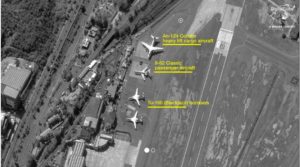
…says military exercises do not constitute threats
Four Russian military aircraft, including two Tu-160 (Blackjack) bombers, one An-124 (Condor) heavy-lift cargo airplane and an IL-62 (Classic) passenger aircraft are seen in this DigitalGlobe satellite image at Simon Bolivar Airport in Maiquetia, Vargas, located about 21 kilometres from downtown Caracas, Venezuela in this December 10, 2018 (Courtesy Satellite image ©2018DigitalGlobe, a Maxar company/Handout via Reuters)
In an effort to quell the growing anxiety of some Guyanese after it was revealed that two state-of-the-art Russian bomber aircraft have been deployed to neighbouring Venezuela, Guyana’s Foreign Affairs Ministry on Thursday said the Government is monitoring the latest developments.
“The Ministry is monitoring ongoing related developments. It is important to note that military exercises are a regular feature of State relations and do not in themselves constitute a threat. Further, Guyana is fully committed to the rule of international law, including the peaceful resolution of disputes. Notwithstanding the ongoing border controversy, Guyana remains open to pursuing meaningful functional cooperation with Venezuela whenever that opportunity arises,” the statement added.
The Foreign Affairs Ministry added that Guyana and Russia have had cordial diplomatic relations since December 17, 1970.
The two Tu-160 bombers landed in Venezuela on Monday in a Russian show of support for the Government of socialist President Nicolás Maduro.
According to the BBC, US Secretary of State Mike Pompeo said it amounted to “two corrupt Governments squandering public funds”. The Russian Government called his words “completely inappropriate”.
The long-range strategic bombers landed at Simón Bolívar Airport outside of the Venezuelan capital, Caracas, on Monday along with two other Russian planes. Venezuela and Russia have long been close allies, and the Russian bombers – as well as a missile cruiser – were sent to the Latin American country in 2008. The supersonic bombers also visited Venezuela in 2013.
The latest visit comes just days after President Maduro met Russian President Vladimir Putin in Moscow. Venezuelan Defence Minister Vladimir Padrino said they were part of air force exercises with its Russian allies.
According to the US, Russia will pull the bombers from Venezuela by Friday.
Venezuela and Russia recently signed contracts to guarantee US$5 billion in investments to boost oil production.
Following the submission of Guyana’s memorial on jurisdiction to the International Court of Justice (ICJ) last month, a date has in turn been set for the Venezuelan Government to submit its own counter memorial.
This was revealed by Foreign Affairs Minister Carl Greenidge, during his contribution to the Budget Debates on Friday last. According to the Minister, April 18, 2019 has been set for Venezuela to submit its counter memorial.
Greenidge remained optimistic that the ICJ has jurisdiction to resolve the controversy; something he noted has plagued its relations with Venezuela. According to the Minister, this issue has undermined the country’s ability to develop its sovereign territory.
On November 19, 2018, Guyana submitted its memorial on jurisdiction to the ICJ, an important step as the country moves forward to have the controversy over the 1899 arbitral award settled. The memorial states that Venezuela is not correct in arguing that the controversy must be resolved exclusively by friendly negotiations, a claim which Guyana says is not justified in the terms of the final 1966 Geneva Agreement to which both parties agreed.
It adds that the boundary was set out between Guyana and Venezuela in 1897 before the October 1899 award. In January 2018, the United Nations Secretary General António Guterres chose adjudication by the Court as the means for finally resolving the controversy, with Guyana filing its case in March of this year.
When US oil giant ExxonMobil announced the first of multiple oil finds in 2015, Venezuela renewed its claim to two-thirds of Guyana’s territory.
On January 30, 2018, Secretary General Guterres concluded that the Good Offices Process – which the parties had engaged in for almost 30 years, but it failed to achieve a solution to the controversy – and chose the ICJ as the next means of settlement, for which Guyana has long been advocating. Sir Shridath Ramphal and Ambassador Audrey Waddell are assisting Minister Greenidge.
The United States has since announced that it supports Guyana’s case.



